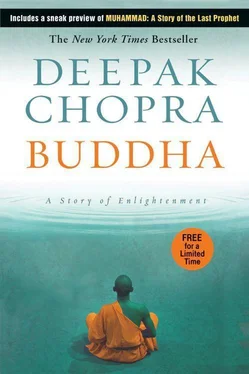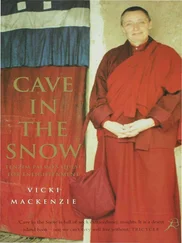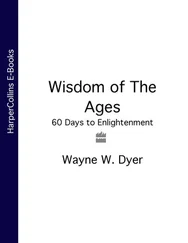“Is he safe, or is he going to die? Tell me now,” Suddhodana demanded.
The eldest jyotishi shook his head. “It was the mother’s karma to die, but the son is safe.” These words were potent; everyone in the room heard and believed them. They would deter a potential assassin, in case someone had been hired to clandestinely murder the prince. Now the stars predicted the failure of any such attempt.
“Go on,” the king demanded. The nearby clamor subsided in anticipation.
“The chart belongs to one who will become a great king,” the eldest jyotishi intoned, making sure that these words too were heard by as many people as possible.
“Why didn’t you say so to begin with? Get on with it. Let’s have it all.” Suddhodana was barking impatiently, but inside he felt tremendous relief.
The astrologers glanced nervously at one another. “There are…complications.”
“Meaning what, exactly?” Suddhodana glared, daring them to take back a word of their prediction. The eldest jyotishi cleared his throat. Canki, the high Brahmin, moved in closer, sensing that he might have to intervene.
“Do you trust us, Your Highness?” the eldest jyotishi asked.
“Of course. I’ve only executed one astrologer, maybe two. What do you mean to say?”
“The chart foresees that your son will not rule Sakya.” Dramatic pause as the king cursed under his breath. “He will hold dominion over the four corners of the earth.”
At this, general consternation broke out. Courtiers gasped, a few applauded, most were stunned. The jyotishi’s words had their intended effect. But Suddhodana stiffened.
“How much am I paying you? Too much. You expect me to believe such a thing?” He forced a bemused tone. He wanted to test the old man’s resolve.
Before the jyotishi could find a reply, however, there was a stirring in the crowd. The oil lamps, which had moved back and forth in the air like wandering stars, became still. Courtiers parted and bowed, making way for someone who had just entered the room-an eminence.
Asita, Asita.
Suddhodana didn’t have to hear the whispered name as it was passed along. He knew Asita on sight; they had met long ago. When Suddhodana was seven, he had been woken up by guards in the middle of the night. A pony was waiting for him beside his father, who rode a black charger. The old king said nothing, only nodding for the retinue to move forward. Suddhodana felt nervous, as his father often made him feel. They rode in a pack of guardsmen toward the mountains, and just when the boy thought he would fall asleep in the saddle, the old king stopped. He had the boy placed in his arms, and they went alone up a scree slope toward a cave above their heads. The mouth of the cave was hidden behind brush and fallen boulders, but his father seemed to know where to go.
He stood in the dawn light and called, “Asita!” After a moment a naked hermit came out, neither obedient nor defiant. “You have blessed my family for generations. Now bless my son,” the king said. The boy stared at the naked man, who appeared by his beard, which was not yet completely gray, to be no more than fifty. How could he have blessed anyone for generations? Then the old king set him on his feet; Suddhodana ran forward and knelt before the hermit.
Asita leaned over. “Do you really want a blessing?” The boy felt confused. “Tell me truthfully.”
Suddhodana had received many blessings in his short lifetime; the Brahmins were summoned if the heir apparent had so much as a runny nose. “Yes, I want your blessing,” he said automatically.
Asita gazed at him. “No, you want to kill. And conquer.” The boy tried to protest, but Asita cut him short. “I am only telling you what I see. You don’t need a blessing to destroy.” As he said these words, the hermit held his hand over the boy’s head, as if administering what had been asked for. He nodded toward the old king, who stood some distance away out of earshot.
“Take death’s blessing,” Asita said. “It’s the one you deserve, and it will serve you well in the future. Go.”
Bewildered but not offended, the boy got to his feet and ran back to his father, who seemed satisfied. But as time unfolded, the boy came to see that his father was a weak king, vassal to rulers around him who dominated with stronger will and greater armies. He came to be ashamed of this fact, and although he never quite knew what Asita meant by death’s blessing, Suddhodana did not object when his own nature turned out to be fierce and ambitious.
“You honor us.” Suddhodana dropped to his knees as Asita approached. The hermit looked older now, but not three decades older, the time since they had last met. Asita ignored the king and walked directly to the cradle. He glanced down, then he turned to face the jyotishis.
“The chart.” Asita waited until the scroll of sheepskin was passed to him. He gazed at it for a moment.
“A great king. A great king.” Asita repeated the words in a flat, emotionless voice. “He will never be.”
Tense silence.
Asita replied, “What do I care about thrones?” He might have been indifferent to the king, but Asita could not take his eyes away from the baby.
“Without a doubt there is a great ruler in his chart,” the eldest jyotishi insisted.
“Do you not see that?” Suddhodana asked anxiously.
But the hermit acted strangely. Without replying, he knelt before the baby with his head bowed. Siddhartha, who had been quiet up to now, took an interest in this new person; he kicked his feet, and one of them brushed the top of Asita’s head. Suddenly tears began to roll down Asita’s cheeks. Suddhodana bent down to lift him to his feet. The revered ascetic allowed this gesture, which under normal circumstances would have been a serious affront to a holy man.
“What did you ask?” he said, seeming like a withered old man at that moment.
“My son-why will he not rule? If he’s fated to die, tell me.”
Asita looked at the king as if noticing him for the first time. “Yes, he will die-to you.” The court stirred restlessly, but Suddhodana, who should have asked all this in private, was beyond caring who overheard. “Explain yourself,” he said.
Asita paused, seeing confusion and dismay in the king’s face. “The boy has two destinies. Your jyotishis were right about only one.”
Although he was speaking to the father, Asita’s gaze never moved from the infant. “Your will is to make him a king. He may grow up to choose the other way. His second destiny.”
Suddhodana looked totally bewildered. “What is this second destiny?”
“To rule his own soul.” A relieved smile crossed the king’s face. “You think that’s so easy?” said Asita.
“I think only a fool would exchange the world for such a destiny, and I will make damn sure my son isn’t a fool.”
“Once he dies to you, you will be sure of nothing.” The king’s smile vanished. “You’re making a mistake. Ruling the world is child’s play. To truly rule your soul is like ruling creation. It is above even the gods.”
The old hermit wasn’t finished. “You too are in his chart. It says you will either suffer over your son as no father ever has or you will bow down before him.”
Suddhodana’s disbelief was a roar. “You’re wrong, old monk. I can turn him into what I want.” Suddhodana’s face was mottled with rage. “Now get out! All of you!”
Even for gossip-hungry courtiers, the drama had been too much. Half the oil lamps had already sputtered out. In the dim light their retreating figures looked like insubstantial shadows bowing their way out of the king’s presence. The jyotishis led the way with profuse apologies and anxious blessings. Canki wanted to be last in the room, but he found it politic to go when the king glared daggers at him. After a moment only Asita was left.
Читать дальше












